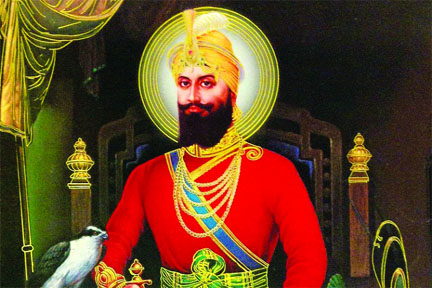
Guru Gobind Singh’s writings form a significant part of Sikh literature and philosophy. Although most of his works are compiled in the Dasam Granth, his compositions extend beyond the text, offering profound insights into spirituality, ethics, and leadership.
Jaap Sahib
– A hymn of praise, Jaap Sahib glorifies the infinite attributes of God.
– Written in Braj and Sanskrit, it emphasizes the omnipresence, omnipotence, and formlessness of the divine.
– The rhythmic and poetic structure inspires devotion and courage, making it integral to Sikh daily prayers.
Akal Ustat
– Translated as “Praise of the Eternal,” this composition celebrates the unity and universality of God.
– Guru Gobind Singh denounces caste discrimination and religious fanaticism, promoting equality and harmony.
Bachittar Natak
– Often regarded as Guru Gobind Singh’s autobiographical account, it narrates his divine mission and struggles.
– It provides a historical perspective on the socio-political challenges of his time.
Chandi di Var
– A poetic retelling of the Hindu mythological tale of Goddess Durga’s battles with demons.
– This work symbolizes the fight against evil and oppression, resonating with the Guru’s mission to empower the oppressed.
Zafarnama
– A Persian epistle written to Mughal Emperor Aurangzeb, Zafarnama is a masterpiece of diplomacy and moral admonishment.
– In it, Guru Gobind Singh condemns Aurangzeb’s deceitful practices and upholds the ideals of truth and justice.
Sarab Loh Granth
– This text focuses on the concept of Sarab Loh (All-Steel), symbolizing strength and resilience.
– It emphasizes the virtues of the Khalsa and the eternal battle between good and evil.
Shabad Hazare
– A collection of hymns that reflect Guru Gobind Singh’s spiritual depth.
– These compositions encourage self-discipline and devotion to God.
Philosophical Themes in
Guru Gobind Singh’s Writings
The Guru’s literary works encapsulate his vision for a society rooted in justice, equality, and spirituality. Key philosophical themes include:
Oneness of God:
– Guru Gobind Singh reinforced the Sikh belief in the singular, formless, and eternal nature of God. His writings often describe God as beyond human comprehension yet accessible through devotion and righteous actions.
Equality and Justice
– He rejected casteism, gender inequality, and religious exclusivism. In works like Akal Ustat, he highlighted the equality of all human beings, urging them to rise above divisions.
Empowerment and Courage
– Through compositions like Chandi di Var, the Guru inspired his followers to embrace courage and fight against tyranny. The symbolism of divine battles in his writings resonated with the Sikh struggle for justice.
Devotion and Discipline
– The Guru emphasized the importance of a disciplined life rooted in devotion, humility, and service. His poetic expressions of love for God inspire Sikhs to remain steadfast in their faith.
Moral Integrity
– Works like Zafarnama underscore the importance of truth and moral integrity, even in the face of adversity. Guru Gobind Singh’s unwavering principles became a moral compass for his followers.
Languages and Styles
Guru Gobind Singh’s mastery of multiple languages allowed him to address diverse audiences and articulate complex ideas effectively.
Multilingual Proficiency:
– His compositions include a blend of Punjabi, Braj, Sanskrit, and Persian, reflecting his cosmopolitan outlook.
– This linguistic versatility made his works accessible to people of different backgrounds.
Poetic and Rhythmic Style
– The Guru used metaphors, similes, and allegories to convey profound spiritual truths.
– The rhythmic quality of his hymns, particularly in Jaap Sahib, enhances their recitation and memorability.
Symbolism
– His use of mythological references, such as Durga in Chandi di Var, served as metaphors for the eternal struggle between good and evil.
Significance of the Dasam Granth
The Dasam Granth, a compilation of Guru Gobind Singh’s writings, holds a central place in Sikh literature.
Structure of the Granth:
– Divided into various sections, including Jaap Sahib, Bachittar Natak, and Chandi di Var.
– Each section addresses different aspects of spirituality, ethics, and governance.
Controversies and Debates
– The Dasam Granth has been subject to scholarly debates regarding its authorship and authenticity.
– However, its spiritual and philosophical contributions remain undisputed among Sikhs.
Practical Applications:
– The teachings of the Dasam Granth continue to inspire Sikhs in their daily lives, encouraging devotion, courage, and self-discipline.
Guru Gobind Singh as a Visionary Poet
Guru Gobind Singh’s literary contributions extend beyond religious texts. His works reflect a profound understanding of human psychology, social dynamics, and the principles of governance.
Empowering the Oppressed
– His writings instilled a sense of dignity and self-worth among the oppressed, inspiring them to challenge societal injustices.
Guidance for Leadership
– The Guru’s teachings on leadership emphasize humility, moral integrity, and a commitment to the welfare of others.
Relevance in Modern Times
– The themes of equality, justice, and resilience in his works remain relevant in addressing contemporary social and political challenges.
Legacy of Guru Gobind
Singh’s Literary Works
The Guru’s writings have left an indelible mark on Sikhism and world literature.
Inspiration for Sikh Practices
– His compositions form the basis of Sikh prayers and rituals, fostering a sense of unity and devotion among followers.
– Scholars and spiritual leaders worldwide acknowledge the literary and philosophical depth of Guru Gobind Singh’s works.
– Efforts to preserve and translate his writings have made them accessible to diverse audiences, ensuring their continued relevance.
Guru Gobind Singh’s literary contributions reflect his multifaceted personality as a spiritual leader, warrior, and poet. His works, rich in philosophy and poetic brilliance, continue to inspire millions, guiding them toward a life of righteousness, courage, and devotion. By blending spirituality with social and political ideals, the Guru redefined the role of literature as a powerful tool for transformation.





Be the first to comment